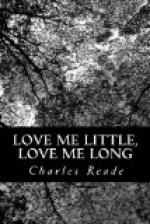All this was said kindly and beautifully, and almost tenderly, but still with a certain majesty that forbade love-making—rendered it scarce possible, except to a fool. But David was not captious. He could not, like the philosopher, sift sunshine. For some days he had been almost separated from her. Now she was by his side. He adored her so that he could no longer realize sorrow or disappointment to come. They were uncertain—future. The light of her eyes, and voice, and face, and noble presence were here; he basked in them.
He told her not to mind a word he had said. “It was all nonsense. I am happier now—happier than ever.”
At this Lucy looked grave and became silent.
David, to amuse her, told her there was “a singing dog aboard,” and would she like to hear him?
This was a happy diversion for Lucy. She assented gayly. David ran for his fiddle, and then for Pepper. Pepper wagged his tail, but, strong as his musical taste was, would not follow the fiddle. But at this juncture Master Reginald dawned on the stable-yard with a huge slice of bread and butter. Pepper followed him. So the party came on the lawn and joined Lucy. Then David played on the violin, and Pepper performed exactly as hereinbefore related. Lucy laughed merrily, and Reginald shrieked with delight, for the vocal terrier was mortal droll.
“But, setting Pepper aside, that is a very sweet air you are playing now, Mr. Dodd. It is full of soul and feeling.”
“Is it?” said David, looking wonderstruck; “you know best.”
“Who is the composer?”
David looked confused and said, “No one of any note.”
Lucy shot a glance at him, keen as lightning. What with David’s simplicity and her own remarkable talent for reading faces, his countenance was a book to her, wide open, Bible print. “The composer’s name is Mr. Dodd,” said she, quietly.
“I little thought you would be satisfied with it,” replied David, obliquely.
“Then you doubted my judgment as well as your own talent.”
“My talent! I should never have composed an air that would bear playing but for one thing.”
“And what was that?” said Lucy, affecting vast curiosity. She felt herself on safe ground now—the fine arts.
“You remember when you went away from Font Abbey, and left us all so heavy-hearted?”
“I remember leaving Font Abbey,” replied Lucy, with saucy emphasis, and an air of lofty disbelief in the other incident.
“Well, I used to get my fiddle, and think of you so far away, and sweet sad airs came to my heart, and from my heart they passed into the fiddle. Now and then one seemed more worthy of you than the rest were, and then I kept that one.”
“You mean you took the notes down,” said Lucy coldly.
“Oh no, there was no need; I wrote it in my head and in my heart. May I play you another of your tunes? I call them your tunes.”




